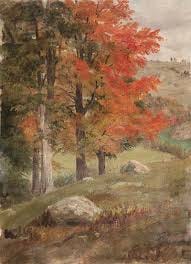'September Song'
Wallow in the wistful lyrics to this 1938 hit by composer Kurt Weill and Pulitzer Prize-winning playwright Maxwell Anderson
But it's a long, long while from May to December And the days grow short when you reach September And the autumn weather turns the leaves to flame And I haven't got time for waiting game And the wine dwindles down to a precious brew September, November, And these few vintage years I'd share with you Those vintage years I'd share with you But it's a long, long while from May to December And the days grow short when you reach September And I have lost one tooth and I walk a little lame And I haven't got time for waiting game And the days turn to gold as they grow few September, November And these few golden days I'd spend with you These golden days I'd spend with you.
What we love about this…
‘September Song’ is not just a sumptuous piece of music (you might know it in Frank Sinatra’s rendition, or from the old movie September Affair, or sometimes sung a capella in close harmony)…it also has some intriguing literary origins and connections.
The song featured in the musical Knickerbocker Holiday (1938) by Weill and Anderson, which was based on American writer Washington Irving’s 'History of New York’ (1809) about the Dutch settlers in New Amsterdam in the 17th century. Weill and Anderson retained the parodic tone of Irving’s work, using it to skewer Roosevelt’s New Deal.
Anderson, now almost forgotten, was a highly successful American writer of the 20th century who wrote dozens of plays and screenplays, including many adaptations of work by other writers such as All Quiet on the Western Front by Erich Maria Remarque and Alan Paton’s Cry, the Beloved Country.
‘September Song’s composer, Kurt Weill, also collaborated with many other lyricists, including most famously Bertolt Brecht. Weill’s ‘Mack the Knife’ is one of his best-known songs; it was written for Brecht’s The Threepenny Opera (1928). Weill and Anderson were in the midst of writing a musical based on Mark Twain’s The Adventures of Huckleberry Finn when Weill died.
You might enjoy some of our other newsletters featuring song lyrics, such as Tropical Thirst and The Leapling Song.
Suggest a LitHit!
Tell us your own favourites from literature you've read, and we can feature you as a Guest Curator. Just email us with the following information:
Your full name
The title of the book you're suggesting
The location of the excerpt within the book (e.g., "in the middle of chapter 5"), or the excerpt itself copied into the email or attached to it (in Word)
Why you love it, in just a few sentences
**Please note that we welcome all suggestions but at the moment we can only release excerpts that are out of copyright and in the public domain. This means 75 years or more since the author's death. You can find many such out-of-copyright texts on the internet, for example at Project Gutenberg and Standard Ebooks.
Let us know what you think…
We did something different in this week’s newsletter, focusing on just one brief quotation and giving a wider context for it. We’d love to know what you think about this approach (and about LitHits generally, of course!). Please email any feedback to our contact address at the bottom of the newsletter. Thank you for taking the time!
About LitHits
LitHits helps you make time for reading by bringing you unabridged excerpts from brilliant literature that you can read on the go, anytime or any place. Our curators carefully select and frame each excerpt so that you can dive right in. We are more than a book recommendation site: we connect you with a powerful, enduring piece of literature, served directly to your mobile phone, tablet or computer.
You might also enjoy...
Writers Make Worlds: https://writersmakeworlds.com/
The Ten Minute Book Club: https://www.english.ox.ac.uk/ten-minute-book-club
Project Gutenberg: https://www.gutenberg.org/
Standard Ebooks: https://standardebooks.org/
Feedback
We'd love to hear your thoughts on our newsletter:
kshepherdb@yahoo.co.uk
Graphic design by Sara Azmy
All curation content © 2024 LitHits. All rights reserved.



